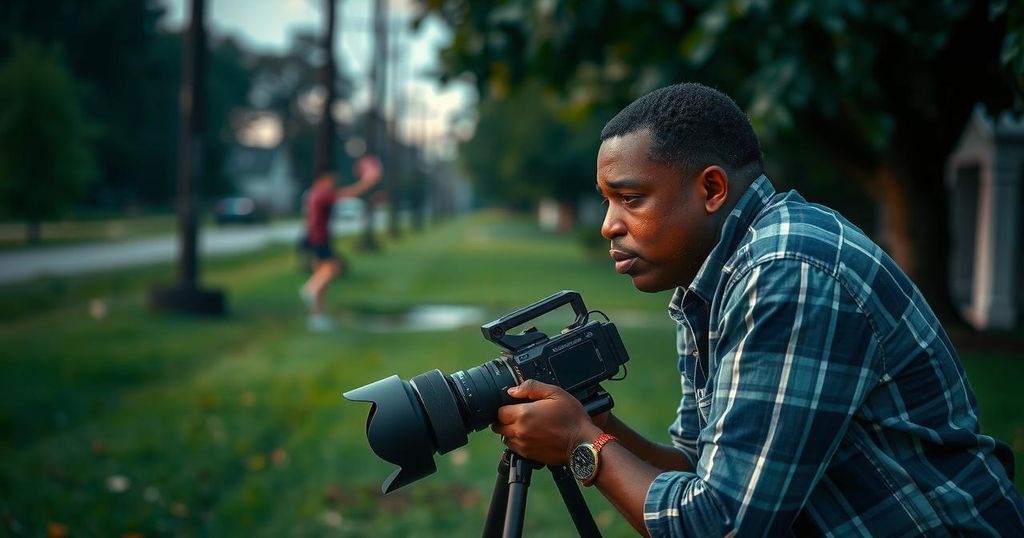Halle Parker, an environmental reporter in coastal Louisiana, reflects on the emotional struggle residents endure due to the looming threats of climate change and flooding. Through her storytelling, she highlights the dual relationship with water—both a vital resource and a destructive force. Parker emphasizes the importance of representation for marginalized communities, aiming to amplify their voices and experiences in the face of ongoing environmental challenges, particularly among Indigenous tribes at risk of displacement due to rising sea levels.
In the coastal regions of Louisiana, journalist Halle Parker captures the intricate and often tumultuous relationship between residents and their environment, particularly highlighting the pressing concerns surrounding water and climate change. Residing in New Orleans, she articulates the emotional weight water holds in the lives of locals, where fears of severe storms and flooding are constant burdens. Parker states, “For homeowners living here, you’re constantly worried about your home getting flooded,” indicating the pervasive anxiety that accompanies heavy rainfall and rising sea levels. Serving as the environmental reporter for WWNO and WRKF’s Coastal Desk, Parker recounts experiences from residents who navigate the dual nature of water as a source of life and recreation, as well as danger and destruction. She finds it both an honor and a responsibility to share the narratives of individuals affected by climate change, believing them to be crucial stories to tell. Hailing from Spotsylvania, Virginia, Parker’s journey into journalism was fueled by her commitment to social justice, stemming from her high school journalism class where she learned the importance of seeking truth in reporting. Early in her career at the Danville Register & Bee, she reported on the effects of climate change on local farmers, further solidifying her dedication to environmental journalism. Parker later transitioned to covering stories in Louisiana, a region she deems pivotal for environmental coverage due to its ongoing land loss crisis, solidifying her belief that it serves as a barometer for climate changes facing the nation. After gaining experience with various news outlets, she shifted her focus to radio, emphasizing the power of auditory storytelling in conveying the emotions and struggles of the communities she reports on. In addition to her position at WWNO, Parker hosts the bi-weekly podcast Sea Change, focusing on the environmental issues that plague Gulf Coast communities. Through her work, she elucidates the deeply interconnected nature of environmental challenges and socio-economic disparities. As a Black woman, Parker asserts the importance of amplifying the voices of marginalized communities, sharing that, “Covering marginalized communities is especially important to me, partially because I am part of one of those communities.” Her commitment extends to volunteering with the nonprofit organization Lead New Orleans, which aims to empower diverse storytellers from affected areas, allowing them to narrate their experiences regarding environmental change. Notably, Parker takes pride in her efforts to document the plight of Indigenous tribes facing displacement due to rising sea levels. She draws inspiration from young leaders such as Devon Parfait, who are proactively seeking solutions for their communities as environmental conditions worsen. This dichotomy of despair and opportunity resonates through Parker’s narratives, as she asserts, “When I get to elevate the voices of people on the front lines of the challenges that we’re all facing, it’s more meaningful to me. In summary, Parker’s work sheds light on critical environmental issues while honoring the personal stories of those living them, reminding us of the collective responsibility to bring attention to these urgent matters.
The article centers on the impactful work of journalist Halle Parker, who covers environmental issues in coastal Louisiana, particularly the emotional and physical consequences of climate change on local communities. Highlighting the duality of water as both a life-giving and destructive force, Parker explores how this relationship shapes the experiences of residents in New Orleans and surrounding areas. As an advocate for marginalized voices, she emphasizes the importance of representing communities often overlooked in mainstream media, especially in the context of environmental justice.
Halle Parker’s dedication to environmental journalism not only highlights the urgent challenges faced by coastal Louisiana communities but also reinforces the importance of storytelling as a tool for empowerment and awareness. By elevating marginalized voices, she fosters a deeper understanding of the complexities surrounding climate change and its far-reaching impacts. Through her work, Parker exemplifies the significant role journalists can play in advocating for affected communities and promoting a broader discourse on environmental issues. In doing so, she urges society to recognize and respond to the interconnectedness of social justice and environmental sustainability.
Original Source: www.waltonfamilyfoundation.org







